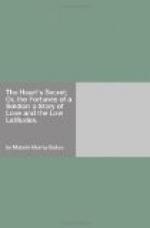“Lorenzo Bezan fond of my daughter, and she of him?”
“Why, yes, father; I don’t see anything so very strange, do you?”
“Do I? Lorenzo Bezan is but a nameless adventurer—a—a—”
“Stop, father—a lieutenant-governor, and the queen’s favorite.”
“That is true,” said Don Gonzales, thoughtfully. “Yes, but he’s poor.”
“How do you know, father?”
“Why, it is but reasonable to think so; and my daughter shall not marry any one with less position or fortune than herself.”
“As to position, father,” continued the boy, “General Bezan wears orders that you would give half your fortune to possess!”
“I forgot that.”
“And has already carved a name for himself in Spanish history,” said Ruez.
“True.”
“Then I see not how you can complain of him on the score of position.”
“No; but he’s poor, and I have sworn that no man, unless he brings as large a fortune as Isabella will have in her own right, shall marry her. How do I know but it may be the money, not Isabella, that he wants?”
“Father!”
“Well, Ruez.”
“You are unjust towards the noble nature of that man; there are few men like him in the queen’s service, and it has not required long for her to discern it.” As the boy spoke, he did so in a tone and a manner that almost awed his father. At times he could assume this mode, and when he did so, it was because he felt what he uttered, and then it never failed of its influence upon the listener.
“Still,” said Don Gonzales, somewhat subduedly, “he who would wed my peerless child must bring something besides title and honor. A fortune as large as her own-nothing else. This I know Lorenzo Bezan has not, and there’s an end of his intimacy with your sister, and I must tell her so this very evening.”
“As you will, father. You are her parent, and can command her obedience; but I do not believe you can control Isabella’s heart,” said Ruez, earnestly.
“Boy, I do not like thee to talk to me thus. Remember thy youth, and thy years. Thou art ever putting me to my metal.”
“Father, do I not love thee and sister Isabella above all else on earth?”
“Yes, yes, boy, I know it; thou dost love us well; say no more.”
Ruez had broken the ice. He found that it was time, however, to be silent now, and leaning back thoughtfully in the volante, he neither spoke again, nor seemed to observe anything external about him until he once more entered the Plato and his father’s noble mansion.
CHAPTER XX.
Happy finale.




